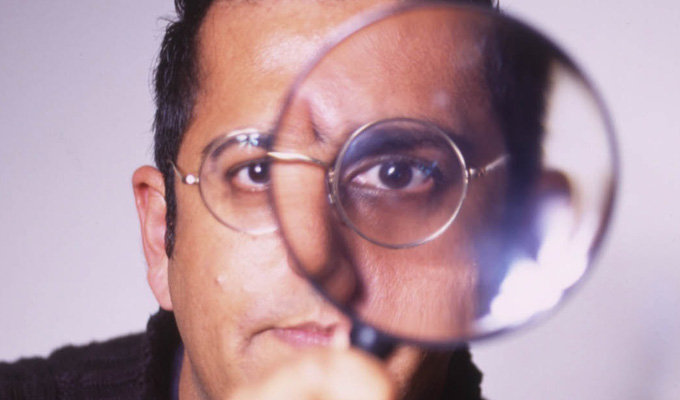 © Bill Green
© Bill Green Why mathematicians make great comedy writers
Simon Singh with the creators of The Simpsons
As the 25th season of The Simpsons starts in the States tonight, Simon Singh – author of The Simpsons and Their Mathematical Secrets – explores the mystery of why so many mathematicians are on the writing team.Most people are astonished to discover that The Simpsons contains dozens of jokes that relate to mathematics. Various episodes include references to everything from calculus to pi, from Mersenne primes to narcissistic numbers, from Klein bottles to Euler’s identity, from Möbius strips to infinity and beyond. For example, a prank about Fermat’s Last Theorem appears in two episodes of The Simpsons, namely Treehouse of Horror VI (1995) and The Wizard of Evergreen Terrace (1998).
This nerdy tomfoolery is less surprising when we explore the backgrounds of the writers, because several of them have degrees in subjects such as mathematics, physics and computer science. Indeed, a couple of writers have PhDs in mathematics and one even resigned a senior post at AT&T Laboratories, one of the world’s most prestigious research labs, in order to pursue a career as a comedy writer.
While writing a book exploring the mathematics in The Simpsons and Futurama, I spent a week interviewing the writers in their offices. As well as discussing specific jokes, many of the writers talked about whether or not a mathematical brain had a distinct approach to comedy and the writing process.
David X. Cohen (MSc, computer science, Berkeley) thinks that mathematically trained comedy writers are more confident and comfortable exploring the unknown armed only with their intuition: ‘The process of proving something has some similarity with the process of comedy writing, inasmuch as there’s no guarantee you’re going to get to your ending. When you’re trying to think of a joke out of thin air (that also is on a certain subject or tells a certain story), there’s no guarantee that there exists a joke that accomplishes all the things you’re trying to do . . . and is funny.
‘Similarly, if you’re trying to prove something mathematically, it’s possible that no proof exists. And it’s certainly very possible that no proof exists that a person can wrap their mind around. In both cases – finding a joke or proving a theorem – intuition tells you if your time is being invested in a profitable area.’
Cohen added that a training in mathematics provides the intellectual stamina required to write an episode of The Simpsons: ‘It sounds fun and easy, but there’s a lot of pounding your brain against the wall. We’re trying to tell a complicated story in a short amount of time and there are a lot of logical problems that need to be overcome. It’s a big puzzle. It’s hard to convince somebody of the pain and suffering that goes into making these shows, because the final product is fast moving and light-hearted. Any given moment in the writing process can be fun, but it’s also draining.’
For a contrasting perspective, I then spoke to Matt Selman, who majored in history before joining the writing team. He identifies himself as the ‘guy who knows least about mathematics.’
When asked why The Simpsons has become a magnet for people with a penchant for polynomials, Selman agreed with Cohen that the scripts are essentially a puzzle and that complicated episodes are ‘a real brain burner’.
Also, according to Selman, the mathematical writers do have a particular trait: ‘Comedy writers all like to think that we’re great observers of the human condition and that we understand pathos, bathos, and all the -athoses. If you wanted to disparage the mathematicians, then you could say that they are cold and heartless, and that they don’t have great jokes about what it’s like to love or to lose, but I disagree.
‘However, there is a difference. I think the mathematical mind lends itself best to writing very silly jokes, because logic is at the heart of mathematics. The more you think about logic, the more you have fun twisting it and morphing it. I think the logical mind finds great humour in illogic.’
This view is shared by Mike Reiss, who was a teenage superstar mathlete, before majoring in English and working on the very first series of The Simpsons: ‘I realised an awful lot of jokes work on false logic. I’ll give you an example. A duck walks into a drugstore and says, “I’d like some ChapStick, please,” and the druggist says, “Will you be paying cash for that?” and the duck says, “No, put the ChapStick on my bill.” Now if incongruity was what made comedy, then it would be funny that a duck walks into a drugstore. It’s not incongruity, but it’s the fact that there’s a false logic to it, which brings all the disparate elements of this story together.’
J. Stewart Burns (MSc Mathematics, Berkeley), has observed that his non-mathematical colleagues will generally offer fully formed gags created in a moment of inspiration, whereas the mathematicians on the writing team have a tendency to offer raw ideas for jokes. These incomplete jokes are then bounced around the writers’ room until they have been resolved.
As well as using this group approach to inventing jokes, the mathematicians also rely on it to develop storylines. According to Jeff Westbrook (PhD, computer science, Princeton), this enthusiasm for collaboration harks back to their previous careers: ‘I was a theoretician in computer science, which meant I was sitting around with other guys proving lots of mathematical theorems. When I came here, I was surprised to discover that it is the same kind of thing in the writers’ room, because we’re also just sitting around throwing out ideas.
‘There’s this common creative thread, which is that you’re trying to solve problems. In one case, it’s a mathematical theorem that’s a problem. In the other case, it’s a story issue. We want to break the story down and analyse it. What is this story all about?’
 Although the writers have offered various explanations of why mathematical minds lend themselves to writing comedy, one important question remains unanswered: Why have all these mathematicians ended up working on The Simpsons rather than 30 Rock or Modern Family?
Although the writers have offered various explanations of why mathematical minds lend themselves to writing comedy, one important question remains unanswered: Why have all these mathematicians ended up working on The Simpsons rather than 30 Rock or Modern Family?
Al Jean (BSc, mathematics, Harvard) has one possible explanation, which emerged as he recalled his teenage years and his relationship with laboratories: ‘I hated experimental science because I was terrible in the lab and I could never get the results correct. Doing mathematics was very different.’
In other words, scientists have to cope with reality and all its imperfections and demands, whereas mathematicians practice their craft in an ideal abstract world. To a large extent, mathematicians, like Jean, have a deep desire to be in control, whereas scientists enjoy battling against reality.
According to Jean, the difference between mathematics and science is paralleled by the difference between writing for a live-action sitcom versus writing for an animated series: ‘I think live-action TV is like experimental science, because actors do it the way they want to do it and you have to stick within those takes. By contrast, animation is more like pure mathematics, because you have real control over exactly the nuance of the line, how the lines are delivered, and so on. We can really control everything. Animation is a mathematician’s universe.’
Published: 29 Sep 2013






